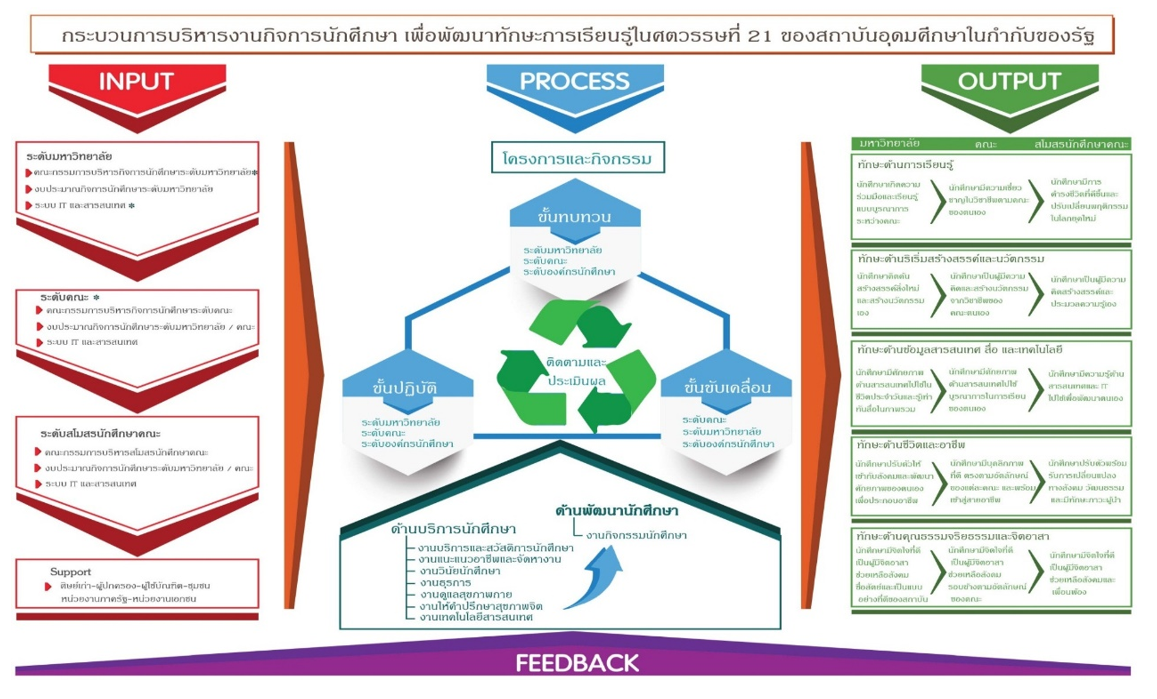The results of the assessment of the Model of Students Affairs Administration to develop the 21st Century Learning Skills of Autonomous University.
Keywords:
Student Affairs, The learning skills in the 21st century, Assessment modelAbstract
The purpose of this research was to evaluate the usefulness and feasibility the Model of Students affairs administration to develop the 21st Century Learning Skills of Autonomous University by handing out the questionnaires to the Student Affairs Executive, professor who working in student affairs, the staff of the student affairs department at the university level and the faculty. In order to evaluate the usefulness and feasibility of 21 sites, a total of 936 people using a proportional sampling method (Proportional Sampling), according to the amount compared to the table of Krejcie & Morgan, can be 274 people or more, with the actual questionnaire collected 220 copies, representing 80.29 percent.
The results of the research showed that the results of the evaluation based on the evaluation from the user of the usefulness and feasibility of this Model. The overall application was at a high level. There are elements of input factors at a high level.
References
กองกิจการนิสิต สำนักงานอธิการบดีมหาวิทยาลัยเกษตรศาสตร์. คู่มือปฏิบัติงาน กองกิจการนิสิต มหาวิทยาลัยเกษตรศาสตร์. สืบค้น 25 กรกฎาคม 2560. จากhttp://www.sa.ku.ac.th/report/pocket.pdf.
ประชุม รอดประเสริฐ. (2543). นโยบายและการวางแผนหลักการและทฤษฎี. (พิมพ์ครั้งที่ 4) กรุงเทพฯ: เนติ กุลการพิมพ์, 67.
ปริยากร มนูเสวต. (2553). รูปแบบการบริหารงานกิจการนักศึกษาที่มีประสิทธิผลของมหาวิทยาลัยเอกชนในประเทศไทย. (วิทยานิพนธ์ระดับดุษฏีบัณฑิต สาขาวิชาการบริหารการศึกษา), กรุงเทพฯ: มหาวิทยาลัยอีสเทิร์นเอเชีย.
มิตร ทองกาบ. (2558). การสร้างและพัฒนารูปแบบการบริหารงานกิจการนักศึกษาสำหรับการศึกษาในระดับอุดมศึกษาของเอกชน. สืบค้น 10 ตุลาคม 2557. จากhttp://journalgrad.ssru.ac.th/index.php/issue14/article/view/391/382.
วัลลภา เทพหัสดิน ณ อยุธยา. (2544). การพัฒนานิสิตนักศึกษา. กรุงเทพฯ: จุฬาลงกรณ์มหาวิทยาลัย.
วุฒิพงษ์ ศรีจันทร์, จำนง แจ่มจันทรวงษ์ และ วีรพันธุ์ ศิริฤทธิ์. (2561). ทักษะการบริหารสถานศึกษาในศตวรรษที่ ของผู้บริหารสถานศึกษา สังกัดสำนักงานเขตพื้นที่การศึกษาประถมศึกษาเชียงราย เขต 2. วารสารมนุษยศาสตร์และสังคมศาสตร์ มหาวิทยาลัยพะเยา, 6(2), 124 – 139. จาก https://so03.tci-thaijo.org/index.php/Humanties-up/article/view/196552/136662.
สำนักงานคณะกรรมการการอุดมศึกษา. (2551). กิจกรรมนักศึกษากับการพัฒนาคุณภาพบัณฑิต. กรุงเทพฯ: สำนักงานส่งเสริมและพัฒนาศักยภาพนักศึกษา.
สำนักงานเลขาธิการสภาการศึกษา. (2559). แผนการศึกษา พ.ศ.2560 -2579. สืบค้น 25 มีนาคม 2562. จาก http://backoffice.onec.go.th/uploaded/Outstand/2017-EdPlan60-79.pdf.
สำนักงานคณะกรรมการการอุดมศึกษา. (2560). กรอบแผนอุดมศึกษาระยะยาว 15 ปี ฉบับที่ 3 (พ.ศ. 2560-2574). กรุงเทพฯ: กระทรวงศึกษาธิการ.
สำนักงานคณะกรรมการพัฒนาการเศรษฐกิจและสังคมแห่งชาติ. (2560). ยุทธศาสตร์ชาติ ระยะ 20 ปี (พ.ศ. 2560 – 2579).
สำนักงานคณะกรรมการพัฒนาการเศรษฐกิจและสังคมแห่งชาติ. (2555). แผนพัฒนาเศรษฐกิจและสังคมแห่งชาติ ฉบับที่ 11 (พ.ศ.2555 - 2559). กรุงเทพฯ.
สำนักงานคณะกรรมการพัฒนาการเศรษฐกิจและสังคมแห่งชาติ. (2560). แผนพัฒนาเศรษฐกิจและสังคมแห่งชาติ ฉบับที่ 12 (พ.ศ.2560 - 2564). กรุงเทพฯ.
สำนักงานคณะกรรมการอุดมศึกษา. (2561). ยุทธศาสตร์การพัฒนานิสิต นักศึกษาในสถาบันอุดมศึกษา (พ.ศ. 2560-2564). สำนักส่งเสริมและพัฒนาศักยภาพนักศึกษา.
สุเมธ แย้มนุ่น. (2558). การดำเนินการจัดทำแผนอุดมศึกษาระยะยาว 15 ปี ฉบับที่ 3 (พ.ศ. 2560-2574) และแผนพัฒนาการศึกษาระดับอุดมศึกษา ฉบับที่ 12 (พ.ศ. 2560-2564). สืบค้น 25 มีนาคม 2562. จาก http://www.stou.ac.th/Offices/Opr/planning/pl_main_v2.1/roadmap20/Document/07.pdf.
Good, C.V. (1973). Distionary of Education. New York: Mc Graw-Hill Bock Company.

Downloads
Published
How to Cite
Issue
Section
License
Copyright (c) 2021 Phayao University

This work is licensed under a Creative Commons Attribution-NonCommercial-NoDerivatives 4.0 International License.
ผู้นิพนธ์ต้องรับผิดชอบข้อความในบทนิพนธ์ของตน มหาวิทยาลัยพะเยาไม่จำเป็นต้องเห็นด้วยกับบทความที่ตีพิมพ์เสมอไป ผู้สนใจสามารถคัดลอก และนำไปใช้ได้ แต่จะต้องขออนุมัติเจ้าของ และได้รับการอนุมัติเป็นลายลักษณ์อักษรก่อน พร้อมกับมีการอ้างอิงและกล่าวคำขอบคุณให้ถูกต้องด้วย
The authors are themselves responsible for their contents. Signed articles may not always reflect the opinion of University of Phayao. The articles can be reproduced and reprinted, provided that permission is given by the authors and acknowledgement must be given.






